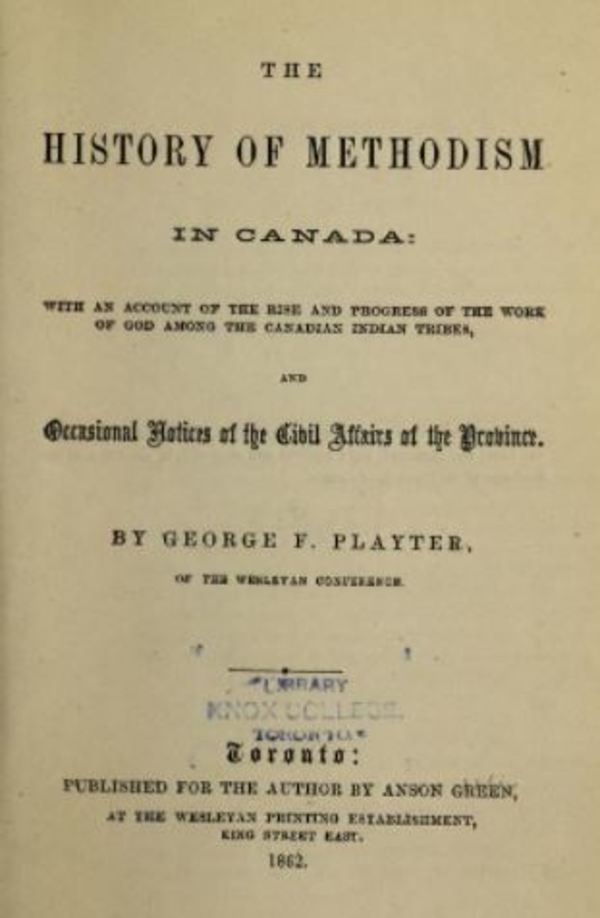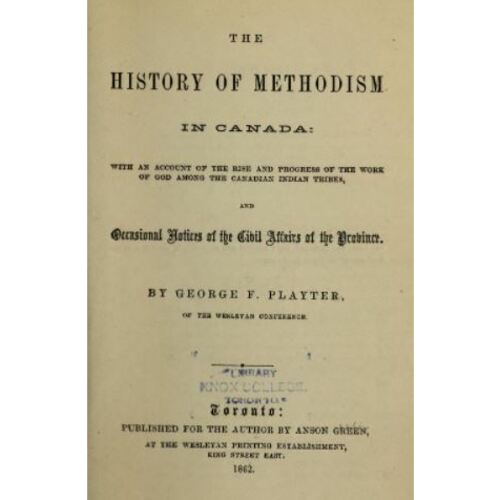
Source: Link
PLAYTER, GEORGE FREDERICK, Methodist minister, author, and journalist; b. c. 1809 in London, England; d. 24 Oct. 1866 in Frankford, Canada West.
Little is known about George Playter’s early years. His literary interests and writing skill suggest that he went to good schools or was encouraged to educate himself. He was evidently raised in a Wesleyan Methodist home and was converted in his youth. Playter immigrated in 1832 to Montreal, where he was employed as a printer. Two years later he entered the Methodist itinerancy in eastern Upper Canada, and in 1838 he was ordained and stationed on the Ottawa circuit.
Although there is no reason to doubt the strength of Playter’s religious commitment, he was seemingly not consumed by that zeal for souls which characterized so many of his brethren. This reticence, combined with his modesty, produced “a clear, terse and satisfactory preacher, very correct, who dealt very much with the conscience. Had he possessed as much passion as point, he would have been very powerful.” His lack of success in the ministry doubtless strengthened his strong literary bent, though it was an avocation he hesitated to pursue because to his colleagues nothing was more important than their evangelical task. Playter was never wholly resigned to his ministerial lot.
The real significance of Playter’s career lies in his work as editor, historian, and polemicist, roles in which he throws light on the development of Upper Canadian Methodism and particularly on the tensions in that community during the 1840s and 1850s. Canadian Methodist leaders were becoming concerned with the development of their church as a social institution. At the same time they did not wholly accept the British Wesleyan argument that the church should be politically conservative or remain aloof from politics. Moreover, though Canadian Methodist ministers were aware that their membership were becoming more liberal, they were unwilling to share their authority with the laity in the conference.
Although he was an immigrant and a convinced Wesleyan, Playter came out strongly against his English brethren in the conflict between the English Wesleyan representatives in Canada and their Canadian colleagues, which in 1840 resulted in the dissolution of the union between the two conferences. In two lengthy letters to the Christian Guardian, entitled “Voice from Canada” and “Second voice from Canada,” Playter assailed the English conference for driving the two conferences apart. British Wesleyan leaders such as Joseph Stinson and Matthew Richey*, unable to enforce obedience on the part of the Canadian conference, established a rival Wesleyan church in Canada West following the dissolution. The actions of the British conference and its missionaries were based, Playter insisted, on a misunderstanding of the true character of Canadian Methodism which, despite its opposition to church establishment and its sympathy for responsible government, was as British in its attitudes and as loyal to the crown and British connection as the English body. There was thus no need to establish a genuinely English form of Methodism in the province; the attempt not only was a waste of resources but ran counter to the fundamental Methodist conviction that Methodists are one in every part of the world. “Persevere not in this work,” he concluded, “Be yourselves again; and we shall be your friends.”
Playter’s firm stance in defence of the Canadian position helped to secure his election as editor of the Christian Guardian in 1844, when political as well as religious controversy was acute. In November 1843 the Reform ministry of Robert Baldwin* and Louis-Hippolyte La Fontaine had resigned over Governor General Sir Charles Metcalfe*’s refusal to follow the ministry’s advice on questions of patronage. Playter contrived to maintain the newspaper’s professed political neutrality and to avoid condoning the conservative position in support of Metcalfe taken by Egerton Ryerson*. In fact, Playter’s sympathies, and those of many Methodist laymen and ministers, were more with the Reform ministers than with the governor. Playter also continued to criticize the British Wesleyan Methodists’ demand that Canadian Wesleyans submit to their authority. His prophetic advocacy of foreign missions and of general Methodist union in British North America as the solution to the continuing strife with the British conference earned him the dislike of those in the Canadian conference such as Anson Green* who were working quietly for an accommodation with the British. In 1845 a decrease in Canadian Methodist adherents led to new efforts for reunion with the English conference. Playter, as a leading anti-Wesleyan, was removed as editor of the Guardian in 1846 to facilitate the reunion which occurred in 1847. Not surprisingly, and again in anticipation of the tension that would develop later in the conference over the role of the laity in the governance of the church, Playter was one of the signatories in 1847 of a pamphlet which criticized the reunion negotiations for strengthening ministerial authority.
Playter resumed his work as a printer in Picton in 1847, but in 1849 he returned to the itinerancy and held several circuits until his early retirement in 1858. During his later years, Playter maintained his dissenting role, a position that reflected his awareness of the necessity to adapt the practices and the policy of Canadian Methodism in the face of a society less content with simplistic preaching and discipline and unwilling to perpetuate clerical oligarchy. But his principal endeavour in this period and his enduring contribution was the preparation of a two-volume history of Methodism in Upper Canada from its inception to 1847. The first volume was published in 1862; evidently the second was completed but the manuscript disappeared in the wake of Playter’s untimely death.
The history of Methodism in Canada was the first account of the subject written by a Canadian minister and published in the province. It is a factual narrative covering the years from 1784 to 1828 based upon “the memories of the aged,” periodicals, and printed documents. “This history,” he wrote, “may be called the ‘Acts of the Methodist preachers in the province of Canada,’ with the motives, difficulties, and consequences.” His account is reasonably dispassionate and concise, and shows a sensitive awareness of the limits imposed by the evidence. It is thus an invaluable record of “how the foundations of the Methodist Church were laid,” and of the Methodist mission to the Indians. John Carroll*, Playter’s friend and defender, would make effective use of his work in his massive Case and his cotemporaries.
Throughout his career, as Carroll noted, Playter was not a principal figure in the Methodist leadership. His death was barely noticed in the Christian Guardian and but for his History his memory would soon have faded entirely. Nevertheless, “he uttered nothing at random, nor anything not worth the uttering.” His study of Methodism, editorials, and pamphlets, formed the outer dimensions of his personal world and are a thoughtful witness to the outlook and the concerns of Canadian Methodism in his generation.
G. F. Playter was the author of The history of Methodism in Canada: with an account of the rise and progress of the work of God among the Canadian Indian tribes, and occasional notices of the civil affairs of the province (Toronto, 1862); Thirty-five reasons why I am not a member of the Episcopalian Church, commonly called the Church of England (n.p., n.d.); and with David Wright et al., Considerations on the proposed reunion of the Canadian and English Wesleyan conferences (Picton, [Ont.], 1847). Christian Guardian, 9 Dec. 1840, 10 Feb. 1841, July–October 1844, 1845–46. Wesleyan Methodist Church in Can., Minutes (Toronto), 1867. Cornish, Cyclopaedia of Methodism. Carroll, Case and his cotemporaries. French, Parsons & politics.
Cite This Article
G. S. French, “PLAYTER, GEORGE FREDERICK,” in Dictionary of Canadian Biography, vol. 9, University of Toronto/Université Laval, 2003–, accessed April 28, 2025, https://www.biographi.ca/en/bio/playter_george_frederick_9E.html.
The citation above shows the format for footnotes and endnotes according to the Chicago manual of style (16th edition). Information to be used in other citation formats:
| Permalink: | https://www.biographi.ca/en/bio/playter_george_frederick_9E.html |
| Author of Article: | G. S. French |
| Title of Article: | PLAYTER, GEORGE FREDERICK |
| Publication Name: | Dictionary of Canadian Biography, vol. 9 |
| Publisher: | University of Toronto/Université Laval |
| Year of revision: | 1976 |
| Access Date: | April 28, 2025 |



